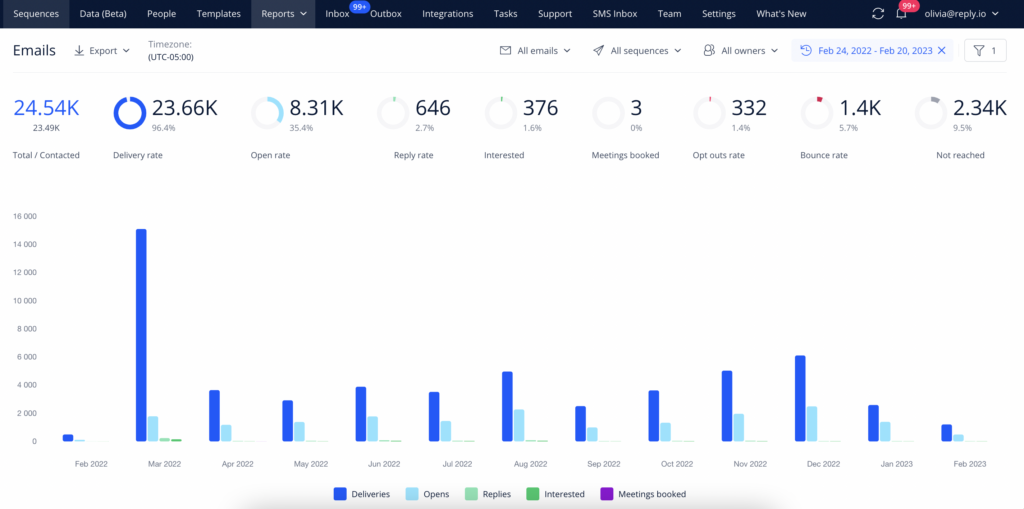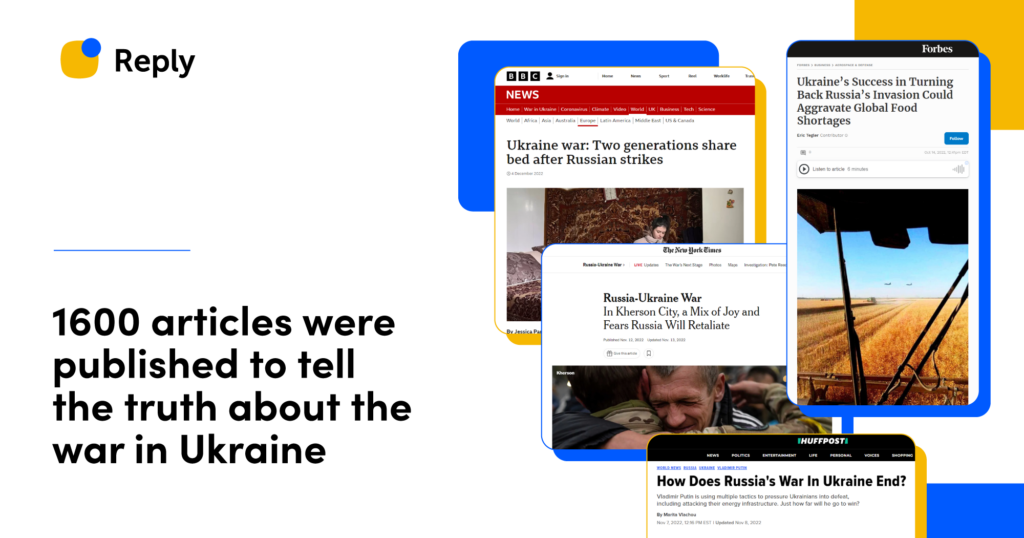
How Reply is helping PR Army spread the truth about the war in Ukraine

Julia Petryk
Co-founder of PR ArmyPR Army is a volunteer organization of communications professionals, created in response to Russia’s invasion of Ukraine. The initiative counts 400+ members, including the PR leaders of well-known Ukrainian companies. Its goals are building a strong Ukrainian presence in the global information space, combating Russian propaganda, and stopping Russian-affiliated businesses.
pr.armyNon-profit
 Julia Petryk
Julia Petryk
Julia Petryk is the co-founder of PR Army. She has over 15 years of experience in digital marketing and digital tech PR. Julia is a PR Daily Award Winner, a lecture and a founder of Tech PR School.
On February 24, like millions of other Ukrainians, I woke up to the sound of explosions and air raid sirens. After the first shock from the news subsided, PR professionals in my network sprung into action.
What later became PR Army, started as a chat created by a handful of volunteers. One of us suggested pitching the networks of media contacts, which every PR manager in the group had, to spread urgent news about Ukraine and counter Russia’s disinformation. We needed to act fast, at an unprecedented scale. Because events were unfolding at the speed of light, our volunteers had to reach out to thousands of international reporters every day. We were swamped with emails.
That’s when we found Reply — or rather, it found us. A few days into the invasion, Reply’s CMO Olivia Milton contacted me and offered PR Army to use Reply for free. Despite being headquartered in the U.S., Reply is a Ukraine-born product with an R&D department based in Ukraine, so they quickly grasped the importance of making Ukrainian voices heard.
By sending pitches as personal emails, with automated follow-ups scheduled, Reply allowed the PR Army volunteers to dramatically scale our outreach. Instead of contacting journalists one by one, we were now able to reach thousands of them with one letter. That ensured our pitches were timely, which was absolutely vital in those hectic first weeks. However dramatic that might sound, Reply helped us clear the fog of war when it mattered the most.
Reply helped us clear the fog of war when it mattered the most.
Scaling in a flash
Normally, communication specialists use a personal approach to contact the media, customizing each sequence and follow-up even if they use automation tools. But in this new reality, we have to act fast and automate our typical flow — while still retaining the personal touch of a hand-crafted email.
My colleague Nastya Popandopoulos, the co-founder of PR Army, explains how Reply has allowed us to have the best of both worlds:
“In communication with reporters and editors, I prefer personal messages, but when something like a mass shelling of civilian objects in Ukraine occurs, we at PR Army have little time. If your database of relevant contacts includes more than 1,000 journalists, you need to be proactive.”
“What has been equally important for us as a volunteer organization is that Reply is very easy to use. Thanks to that, we can put new recruits to work on their first day, with little to no additional training.”
Reply gives us the ability to save time and get things done faster, which is crucial for our team. After all, we’re juggling volunteer work and our full-time jobs, while having to go to bomb shelters multiple times a day.
This newly found efficiency has helped PR Army grow into a 400+ member organization that is now making a serious impact in the information war.
How our work with Reply is organized
Getting started with Reply was easy. Along with the Reply tool, Olivia Milton provided a detailed tutorial on how to use it. There were also lessons on how to set up email blasts correctly within the product. Besides, customer support was ready to help at any time.
Very soon, we had an established process allowing us to contact thousands of journalists every day. Here’s what this process looks like today.
Step 1 – The media base. The PR Army volunteers start by building up a base of relevant journalists on various topics that need to be covered: politics, trade, human rights, war crimes, etc.
Step 2 – The pitch. As soon as an important event occurs in Ukraine, an outreach specialist prepares a pitch.
Step 3 – Launching the outreach. We create a sequence of personal emails including the initial pitch and several follow-ups and launch the outreach.
The PR Army volunteers have their email accounts connected to Reply, so the emails are sent on their behalf. And by using a set of variables, the emails can be comprehensively personalized — for example, include the name of the publication.
Once the campaign is on, the PR Army volunteers start searching for witnesses and experts on the topic. With scheduled follow-ups, we don’t need to reach out to every journalist to ensure the pitch was seen. So by automating the outreach, Reply frees up resources for other important work.
The results we’ve achieved with Reply
Over 9 months of the war, PR Army has sent over 50 outreach campaigns with Reply. According to my colleague Viktoria Povarchuk, the Media Relations Manager, our average mailing targets 1,500 – 2,000 contacts. And on some days, we have 2 or 3 pitches on different topics to send out. Doing all this work manually would take up to 5 days, but with Reply, it takes about 10 minutes. Thanks to that, we are able to send emails every other day, with the best days being Monday, Tuesday, Wednesday, and Thursday.

The response rate varies depending on the topic. According to Viktoria, our most effective campaign was the one about the missile strike on a shopping mall in Kremenchuk, when 1,000+ people were injured. We then sent out 2,000 emails and got an open rate of 36.6%.
These numbers aren’t just numbers though — they translate to multiple publications about Ukraine in reputable media. BBC has covered our story about a war-affected family in the Kyiv region. Forbes has published an analysis of the grain deal situation based on our pitch, and Newsweek has covered Russia’s hidden recruitment efforts. We were also able to achieve multiple publications in regional media, such as Le Temps, El Independiente, Süddeutsche Zeitung, and others.

In addition to pitching news stories, PR Army has helped multiple media find relevant experts and witnesses for their Ukraine coverage. For example, we’ve provided a military expert for a Huffington Post story, an energy expert for a Vox article, an eyewitness for a New York Times story, and survivors of Russia’s siege of Mariupol for a Newsweek interview. USA Today has published a series of illustrated stories of Mariupol survivors, who were also found by PR Army.
As the war continues raging in Ukraine, so does the information war on all of the media platforms available to the international audiences. So the PR Army volunteers continue our fight for ongoing and truthful Ukraine coverage in the media — with an essential help from Reply.

Other case studies




